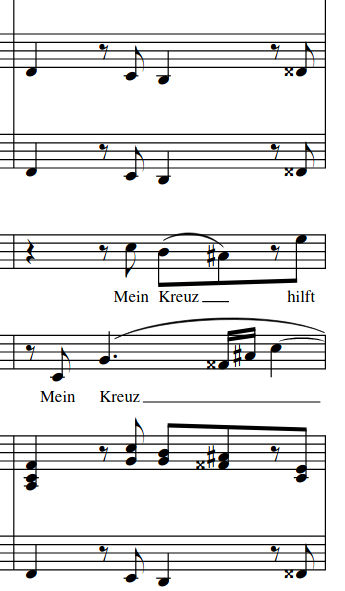Playlist
Translation
| German Text | English Text |
|---|---|
| German Text | English Text |
Analysis
This chorale cantata was first performed on January 14th 1725 and the text Bach set bears very little relation to the appointed Gospel or Epistle readings for the day. It is based on a 1587 hymn by Martin Moller that is all about Jesus being the comforter and helper -and whilst you could sort-of see the Gospel story as involving Jesus being the comforter and helper of bad wedding planners, it's a bit of stretch!
The opening movement is rather beautiful and elegaic with a rather fine orchestral accompaniment that involves two oboes d'amore, each weaving chromatic threads around the other. The chorale melody itself is held by the basses, doubled with trombones. The tune keeps re-appearing between recitativo passages in the second movement. It re-appears, rather more predictably, in the closing chorale.
The elaborate bass aria contrasts earthly woe with heavenly joy and uses high chromaticism to point up the woes and long, melismatic runs to stress the heavenly joys. It's quite an effective contrast of moods and emotions.
The soprano and alto duet is particularly beautiful, especially the way in which the oboes and violin combine to produce a rather lovely aural effect. The interplay of the two voices thereafter is handled with Bach's customary contrapuntal skill. It certainly banishes gloom and sounds joyful, as the 'everything will turn out for the best' words imply it should be. If you check the score out, too, you'll notice that Bach is being his usual 'intellectual game-player' self: at the mention of Jesus helping me 'bear my cross', Bach starts scattering double sharps throughout the various parts:
Double-sharps are marked by crosses, of course. Ba dum tss!
The final chorale repeats the opening chorale melody -but this time, it's the sopranos that carry the tune, this time doubled by a horn.
The overall effect of this cantata is not especially impressive: it comes across as a neat job of work, with high levels of inventiveness, but lower levels of profound inspiration. It's not a cantata you're going to love and remember -nor one you'll hate, either. It's a bit of a middling affair, I think.
